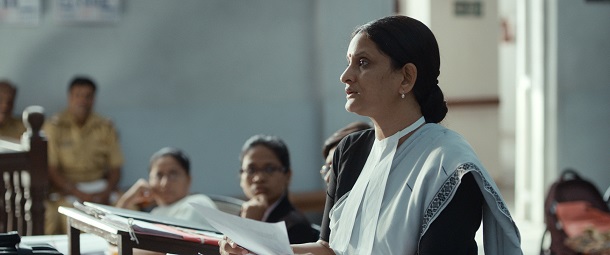
Writer|Director: Chaitanya Tamhane
Cast: Vira Sathidar, Vivek Gomber, Geetanjali Kulharni, Pradeep Joshi
116min | Drama | India 2014
COURT is a mature and analytical debut for first time director Chaitanya Tamhane, and won him the Orrizonti Prize at Venice Film Festival (2014): Not only does it deal with the disturbingly inefficient court system in India, but also the confrontation of different social classes, cultures and generations.
In Mumbai, in the state of Maharashtra, a folksinger and political activist Narayan Kamble (Sathidar) is accused of causing the death by suicide of a sewer worker: allegedly, one of his songs called for “all sewer workers to commit suicide”. His lawyer, an upper class Gujurati, Vinay Vora (Vivek Gomber, who also produced the film), tries to convince judge Sadavarte (Joshi), that his client is innocent since there is no proof of suicide. But prosecutor Nutan (Kulharni) is adamant about Kamble’s guilt: she uses colonial laws from Victorian times and all sorts of prejudice to convince the judge, asking for no less than twenty years imprisonment for the accused. And although Kamble is a native of Maharashtra, the folk singer is also a lower-caste Marathi. But Mumbai is a huge cosmopolitan city; home to people whose heritage is from other states, at both ends of the social scale. Nutan’s ideology is that of a petite bourgeoise, disliking Kamble for the simple fact that he is a Dalit (Untouchable), whether guilty or not, and she is afraid of any subversive activity (how ever far-fetched) the singer might engage in.
After the widow of the dead sewer worker testifies that her husband never talked about suicide, but was suffering from the sulphur gases of the sewage system, Vora at least gets bail for his client, paying the 100 000 Rupees himself, with no hope of seeing any of the money. But Kamble returns from prison to publish his poetry and is arrested again for breaking the rule of his bail conditions. With a whole month of court holidays coming, Vora tries to save the 65 year-old singer from another prison stretch.
Courtroom dramas are usually full of emotional confrontations and dramatic incidents, but COURT showcases the rather pedestrian system where postponements and archaic laws dominate proceedings. Tamhane claims the idea came about: “When I attended a non-descript lower court in suburban Mumbai, the sheer lack of drama, and the casualness with which life and death decisions were being made, sparked my imagination”. But COURT is much more than a matter of how the law is applied: Vora is clearly a member of the new upper-class, and whilst his parents are traditional and only interested in grandchildren, their son loves his bachelor life. In contrast, prosecutor Nutan is an ordinary, middle class mother who cooks for her family and talks non-stop about groceries.
COURT is an immersive and engaging film: DoP Mrinal Desai’s widescreen images are precise: in the courtroom scenes he uses a static camera, showing the rigid system in all its ponderings. On the outside, everything is lively and fluid, in contrast the courtroom sessions, with their biased rules and incompetent procedures, take up most of the day. Tamhane never forces the tempo, letting everything unravel gradually, including the well-drawn personalities who are full of contradictions arising from a society where the pre-colonial world view and the modern, enlightened but crass materialistic society collide. AS
OUT ON GENERAL RELEASE AT SELECTED ARTHOUSE VENUES FROM 25 MARCH 2016
Winner: Orizzonti Award for Best Film and Lion of the Future – Luigi De Laurentiis Award for Debut Film, Venice Film Festival 2014 | More info: www.day-for-night.org/court-film